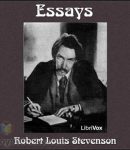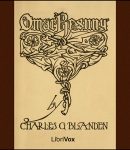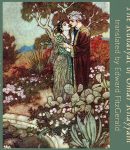
Short Poetry Collection 106
This is a collection of poems read by LibriVox volunteers for March 2012. [chương_files]











This is a collection of poems read by LibriVox volunteers for March 2012. [chương_files]

“Extreme busyness…is a symptom of deficient vitality; and a faculty for idleness implies a catholic appetite and a strong sense of personal identity.” What comforting words for the idle among us! Like many of the best essayists, Stevenson is very much the genial fireside companion: opinionated, but never malicious; a marvellous practitioner of the inclusive monologue. In this collection of nine pieces he discusses the art of appreciating unattractive scenery, traces the complex social life of dogs, and meditates in several essays upon the experience of reading literature and writing it. Perhaps his most personal passages concern death and mortality. Here we meet him at his most undogmatically optimistic, as he affirms a wholesome faith in “the liveableness of Life”. [chương_files]

Most of the translations of the Rubaiyat of Omar Khayyam have been in verse. However, there have been three notable exceptions to this convention; the French translation by J. B. Nicolas (1867), the English version by Justin Huntly McCarthy (1889) and another English version by Frederick Rolfe (better known as Baron Corvo, the author of Hadrian VII), published in 1903. Charles Blanden (1857 – 1933) belonged to the group known as the Chicago poets, the most famous of which was Carl Sandburg. Unlike his celebrated contemporary. Blanden was no innovator, and most of his verse is sweet and melodious, composed with craftsmanlike skill, but often lacking in imaginative fervour. Most of his collections of verse, bearing such titles as The Battle of Love, A Chorus of Leaves, A Drift of Song, and A Valley Muse, were published in limited editions, which have not since been reprinted, and today his poetry is considered of little more than historical interest. One of Blanden’s most engaging enterprises was his verse reworking of Justin McCarthy’s prose translation of the Rubaiyat, which was published in 1901. Blanden uses an eight line verse structure with a rhyming scheme of ABABCDCD. As he was working with images and arguments supplied by a poet far more eloquent than himself, Blanden was free to focus on the elegance and flow of the lines, and as a result, the work predominantly reflects his skill in versification, which was considerable, rather than his own conceptions, which were often commonplace. It cannot […]

“Long before I knew that the speech of men was misused by them and that they lied in the hearing of the gods perpetually in those early days through which all men have passed, during which one believes what one is told, an old and crusty woman of great wealth, to whom I was describing what I intended to do with life (which in those days seemed to me of infinite duration), said to me, ( You are building castles in Spain.’ I was too much in awe of this woman not on account of the wealth, but on account of the crust to go further into the matter, but it seemed to me a very foolish thing to say, for I had never been to Spain, and I had nothing wherewith to build a castle and indeed such a project had never passed through my head.” — Hilaire Belloc [chương_files]

A dozen assorted articles from British and American periodicals, including The Atlantic Monthly, Punch, The Chicago Record-Herald, Chambers’s Edinburgh Journal, Lippincott’s Magazine of Popular Literature and Science, The Library, St. Nicholas, American Missionary, The Great Events by Famous Historians, and The Continental Monthly. [chương_files]

This is a collection of poems read by LibriVox volunteers for June 2012. [chương_files]

This is a collection of poems read by LibriVox volunteers for July 2012. [chương_files]

This is a collection of poems read by LibriVox volunteers for the month of September and October 2010. [chương_files]

“Sketches by “Boz,” Illustrative of Every-day Life and Every-day People (commonly known as Sketches by Boz) is a collection of short pieces published by Charles Dickens in 1836 accompanied by illustrations by George Cruikshank. The 56 sketches concern London scenes and people and are divided into four sections: “Our Parish”, “Scenes”, “Characters”, and “Tales”. The material in the first three of these sections is non-fiction. The last section comprises fictional stories. Originally, the sketches were published in various newspapers and periodicals from 1833-1836.” [chương_files]

The Rubáiyát of Omar Khayyám (Persian: رباعیات عمر خیام) is the title that Edward Fitz-Gerald gave to his translation of a selection of poems, originally written in Persian and of which there are about a thousand, attributed to Omar Khayyám (1048–1131), a Persian poet, mathematician and astronomer. A Persian ruba’i is a two-line stanza with two parts (or hemis-techs) per line, hence the word “Rubáiyát” (derived from the Arabic root word for “four”), meaning “quatrains”. The translations that are best known in English are those of about a hundred of the verses by Edward FitzGerald (1809–1883). Of the five editions published, four were published under the authorial control of FitzGerald. The fifth edition, which contained only minor changes from the fourth, was edited after his death on the basis of manuscript revisions FitzGerald had left. FitzGerald also produced Latin translations of certain rubaiyat. As a work of English literature FitzGerald’s version is a high point of the 19th century and has been greatly influential. Indeed, The term “Rubaiyat” by itself has come to be used to describe the quatrain rhyme scheme that FitzGerald used in his translations: AABA. However, as a translation of Omar Khayyam’s quatrains, it is not noted for its fidelity. Many of the verses are paraphrased, and some of them cannot be confidently traced to any one of Khayyam’s quatrains at all. Some critics informally refer to the FitzGerald’s English versions as “The Rubaiyat of FitzOmar”, a nickname that both recognizes the liberties FitzGerald inflicted on his […]
Copyright © 2024 | FreeAudible